Thinking about going green with your next vehicle? Hybrid and electric cars both offer fuel savings and eco-friendly benefits, but which one is the better fit for your lifestyle? From driving range to charging convenience—and even how they handle in different weather conditions—we’ll break down the pros and cons to help you decide.
What’s the difference?
- Hybrid Vehicle: A hybrid car has a gasoline engine and an electric motor. The gas engine and battery-powered motor work together to improve fuel efficiency and reduce emissions. Hybrids don’t need to be plugged in because they recharge the battery while you drive.
- Electric Vehicle (EV): An EV runs entirely on electricity. It has no gas engine—just a battery and an electric motor. EVs need to be plugged in to charge, and they produce zero emissions, making them an eco-friendly choice.
Pros and Cons
Let’s take a deeper dive and explore the pros and cons of each, including how they fare in extreme weather.
Hybrid Vehicles
Pros
- Better Fuel Efficiency – Hybrids use less gas than traditional cars, saving money at the pump.
- No Charging Required – The battery recharges while you drive, so there’s no need to plug it in.
- Smoother, Quieter Ride – The electric motor helps reduce engine noise and provides a seamless driving experience.
- Longer Driving Range – Since hybrids use both gas and electricity, you won’t have range anxiety like with some EVs.
In Extreme Weather…
- Quick Warmup – A hybrid may be safely driven with only a short warmup—about a minute in cold weather.
- Less Affected by Cold Weather – Since hybrids have a gas engine, they don’t rely solely on battery power, which helps maintain performance in freezing temperatures.
- No Need for Charging – Unlike EVs, hybrids don’t depend on charging stations, which can be slower or less available in extreme conditions.
- Consistent Range – Cold or hot weather has less impact on a hybrid’s driving range compared to a fully electric vehicle.
Cons
- Less Fuel Savings Than an EV – Hybrids still rely on gas, so it’s not as cost-effective as a fully electric vehicle in the long run.
- More Maintenance Than an EV – Since hybrids have both an engine and a battery system, they require more maintenance than an all-electric car.
- Battery Replacement Costs – The hybrid battery can be expensive to replace, though it usually lasts many years.
In Extreme Weather…
- Reduced Fuel Efficiency in Cold – The gas engine runs more often in low temperatures, slightly lowering fuel economy.
- Battery Performance Can Drop – While not as noticeable as in EVs, extreme cold can still reduce battery efficiency.
- Hot Weather Can Strain the System – High temperatures may cause the battery and engine to work harder, potentially leading to wear over time.
Electric Vehicles
Pros
- Zero Emissions – EVs don’t burn gas, making them the most eco-friendly option.
- Lower Operating Costs – Charging is often cheaper than fueling up, and there’s no need for oil changes or many traditional maintenance
- Quiet and Smooth Ride – Electric motors make EVs nearly silent and provide instant acceleration.
- Fewer Moving Parts – Less wear and tear means fewer repairs compared to gas or hybrid cars.
- Incentives and Tax Credits – Many EV buyers qualify for government rebates and incentives, reducing the purchase cost.
In Extreme Weather…
- Instant Start – EVs don’t have traditional engines that require oil or warming up, so they start instantly, even in freezing temperatures.
- More Efficient in Stop-and-Go Traffic – Unlike gas-powered cars, EVs don’t waste energy idling, making them efficient in winter traffic jams.
- Preconditioning Helps – Many EVs allow you to warm up or cool down the car while plugged in, reducing the impact on battery life.
Cons
- Higher Upfront Cost – EVs can be more expensive than gas or hybrid cars, though prices are improving.
- Limited Range – Some EVs can’t travel as far on a single charge as a gas or hybrid car can on a full tank.
- Charging Time – Even fast charging takes longer than a quick stop at a gas station.
- Charging Infrastructure – Public charging stations aren’t as common as gas stations, and home charging requires special installation.
- Crash-related fires – Should a crash occur, and damage the battery, it could spark a fire. EV fires are much harder to control than those of gas-powered vehicles.
In Extreme Weather…
- Cabin heat – It takes a lot of battery to warm the cabin. It’s better to warm the cabin while the car is still plugged in for about 5-10 minutes. Otherwise, you’ll reduce your driving range significantly.
- More HVAC Impact – Heating and cooling the cabin draws power from the battery, further reducing range.
- Reduced Range in Cold Weather – EVs can lose 10–36% of their range in freezing temperatures because the battery works harder.
- Slower Charging in the Cold – Charging times increase in low temperatures, making it less convenient for road trips.
- Hot Weather Can Overheat Batteries – High heat can degrade battery life over time and make charging less efficient.
Both hybrids and EVs typically cost more to repair than gas-powered cars due to specialized parts and technology (like battery systems). This can lead to higher insurance premiums. Talk to your insurer about a policy that’s right for your budget and needs.
This article is furnished by California Casualty, providing auto and home insurance to educators, law enforcement officers, firefighters, and nurses. Get a quote at 1.866.704.8614 or www.calcas.com.
- Staying in Control with Driver Assist - February 13, 2026
- Inexpensive Romantic Ways to Say “I Love You” - February 11, 2026
- Foot Care for Nurses - January 30, 2026

